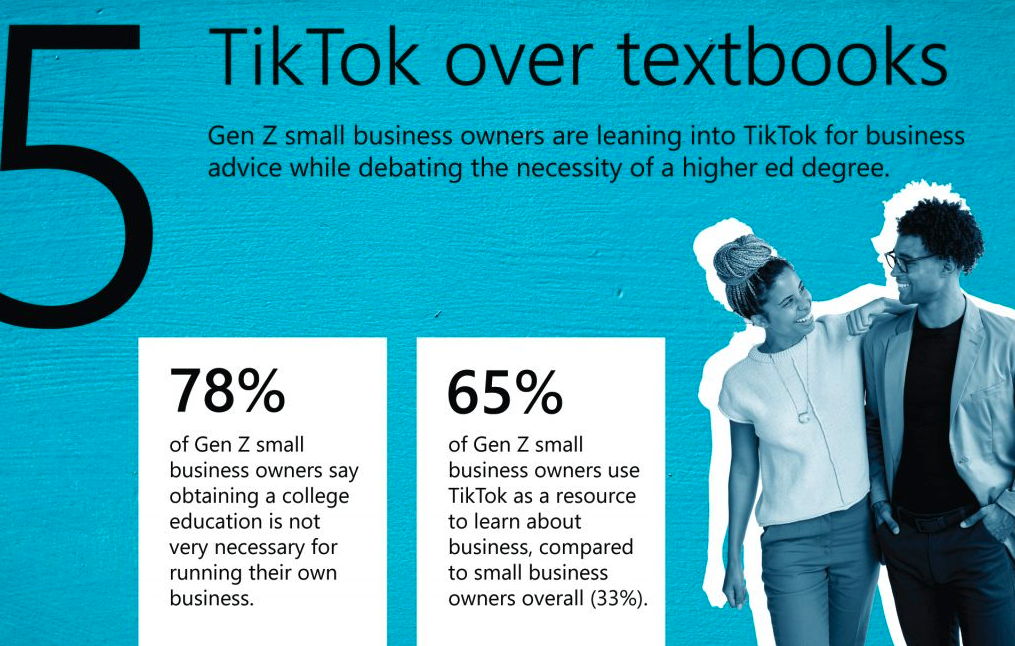Facebook Outlook, Gen ZMB, Oliver's Tech Takedown

Debating the Outlook for Facebook
A number of speculative articles have recently appeared, some undoubtedly driven by schadenfreude, about whether Facebook/Meta is merely pivoting or foundering. For example, the WSJ opines: "Meta ... seems to be genuinely threatened in the near term by several factors that could hurt its revenue and reach." The list includes regulation, Apple (and Google) privacy changes, TikTok (and similar) competitive threats, impatient investors and a costly bet on the metaverse. Others are more blunt, also pointing out that Facebook has lost its chief revenue architect (Sandberg). There have been numerous commentaries arguing Facebook's metaverse is "dead on arrival" (ex: here, here). Then there are those bullish on the metaverse but who argue Facebook's specific vision is wrong. I would also argue years of scandal have taken a toll on the brand.

Our take:
- It's easy to find Facebook critics but harder to find boosters these days. Yet it's far too early to write the company off.
- Interesting observation: Facebook is #1 on the list of Google's top 1,000 keywords by volume. But it's trending downward.
- Is Facebook more like MySpace or Microsoft? MySpace was eclipsed and couldn't recover. Microsoft had major product failures but is more valuable than ever thanks to B2B efforts and smart leadership.
John Oliver's (Funny) Antitrust Pitch
John Oliver's monologue on Last Week Tonight is perhaps the most effective argument for antitrust regulation you'll find anywhere. (It's also very funny.) As a refresher, there are two antitrust bills pending in Congress: the American Innovation and Choice Online Act (AICO) and the Open App Markets Act (OMA). AICO prohibits self-preferencing by online "gatekeepers." OMA is designed to break open app-store monopolies. Big tech companies have spent millions to defeat these bills, astroturfed SMB support and laid out "a parade of horribles" should they pass: hurting the consumer UX, harming SMBs, helping China, compromising security, hurting people of color and so on. Oliver ridicules those arguments. He points to the 1984 breakup of AT&T as an analogous event. Company leaders predicted disaster. But the move unlocked competition and arguably paved the way for the internet (though there are skeptics and caveats).
Our take:
- Used to illustrate zero-click search, the "dolphin digression" alone is worth watching the 26 minute segment for.
- Recent "unintended consequences" pieces (e.g., WaPo) argue, though well-intentioned, these bills would cause negative consumer outcomes.
- Democrats have said they will bring these bills to a floor vote. They will need 60 votes. With about a two month window, it'll be a squeaker.
'Generation ZMB' Snapshot
More than two million small businesses (SMBs), responsible for roughly 25 million jobs, are run by boomers on the cusp of retirement. Gen Xers and Millennials are owners too, but the market will evolve more rapidly as Gen Z takes over. A new Microsoft report on Gen Z entrepreneurs hints at the future. It reports that 62% of Gen Z have started or will start their own businesses. (Demographically, Gen Z represents ~65 million people in the US and nearly 40% of consumers.) One of Gen ZMB's motivations is retiring early, which they think would take longer by going corporate. Beyond early retirement, social good is another big ambition. And most believe college or advanced degrees are unnecessary to run businesses (perhaps). TikTok is seen as a primary resource to learn about entrepreneurship (maybe). Finally, Gen Z entrepreneurs also tend to work unconventional hours and maintain side hustles.

Our take:
- Even though SMBs are struggling with inflation, hiring challenges, starting a business remains highly attractive to younger people.
- If the data are correct – 62% of Gen Zer's want to start businesses – demand for SMB-related SaaS services will continue to grow.
- Culturally, ZMBs will be quite different than their predecessors, including attitudes toward remote work, online tools and e-commerce.
Recent Analysis
- Near Memo episode 68: Amazon's Local Ads, Just Yep it, Apple BNPL & Spotlight search, Auto-created Google Ads appearing.
- ICYMI: Google on a Review Takedown Tear, by Mike Blumenthal.
Short Takes
- Google Engineer claims LaMDA now sentient, others disagree.
- Google settles gender discrimination class-action for $118M.
- Apple CEO urges lawmakers to quickly pass federal privacy law.
- Revisiting Apple Maps announcements at WWDC.
- How Apple CarPlay will soon become like a CarOS.
- Mall owner Simon wants to create a Prime Day for physical retail.
- Return to the office doesn't seem to be working for anybody right now.
- Study argues that remote work creates more silos in organizations.
- Despite recession fears, GroupM says: 8.4% global ad growth in 2022.
- Molly White: Problems of managing identity in cryptoworld.
- Wall Street Journal readies launch of e-commerce site Buy Side.
- Tim Horton's egregious smartphone spying, no penalties (NYT).
- Trump's Truth Social censoring posts about January 6 hearings.
- Target introduces AI-based robot manicure machine in two Texas stores.
- Tools like OpenAI's DALL-E are the future of design and illustration.
Listen to our latest podcast.

How can we make this better? Email us with suggestions and recommendations.

